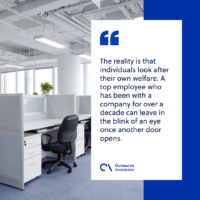Dell’s RTO mandate
Technology company Dell has enforced a prickly return-to-office (RTO) mandate that could shake up the future of work post-pandemic.
Under the new rules, employees in “hybrid” roles must report to a company office. They can opt to go fully remote, but the downside is that they will be passed over for promotions and raises.
Other tech companies, such as Apple and Amazon, have enforced similar RTO policies, but Dell is the first to disincentivize work-from-home sternly.
A smart compromise
It must be noted that Dell only requires employees to report to the office 39 days per quarter or three times a week. This policy is a smart compromise with the workforce’s changing workplace preferences.
The RTO mandates are not regressive, as some critics say. Rather, they are introducing a revised arrangement in line with the new workforce behaviors.
The COVID-19 pandemic pushed businesses to align corporate policies with global stay-at-home mandates. With the pandemic well behind us, these firms are reevaluating these guidelines to fit with the times.
Team first approach
Dell is choosing to optimize for the team instead of the individual, and rightly so. As the economy has tightened, businesses have realized that the team must come first.
Any half-decent sports team knows this. There is no individual more important than the team. They say that’s why the team name is on the front of the shirt and the players’ name is on the back.
A team-first approach seems to be the only path to success, even amid the ongoing work revolution.
Individuals leave companies all the time for opportunities elsewhere, a career shift, a fresh start, or other personal reasons. The reality is that individuals look after their own welfare. A top employee who has been with a company for over a decade can leave in the blink of an eye once another door opens.
The world’s best companies are prepared for the inevitable. Even if someone leaves abruptly, a new employee or a group of people should be ready to take over leftover tasks and even take the company to the next level.
Business must go on. The departure of one person should not cripple operations. Big companies like Dell want employees who can abide by their policies. The company is simply securing its employee line and its future.
While nurturing the individual is imperative, if a business wants to survive the rapid and unpredictable changes in the world and the economy, it must prepare itself for the long run. And this means doing what’s best for the group.
Question for your business
Is your business leaning team first or employee first?




 Independent
Independent





















